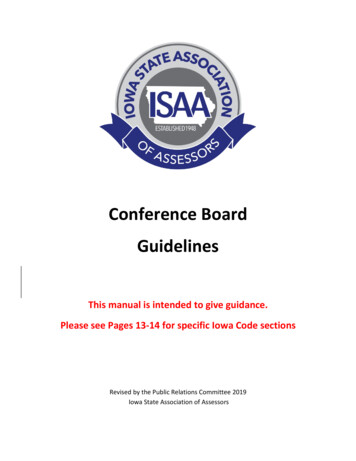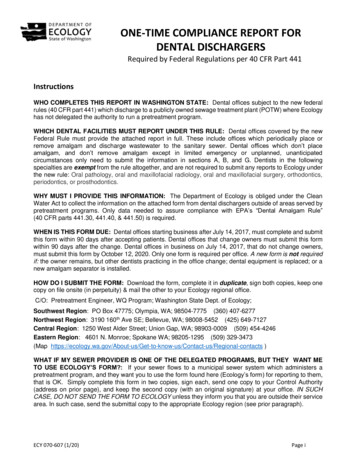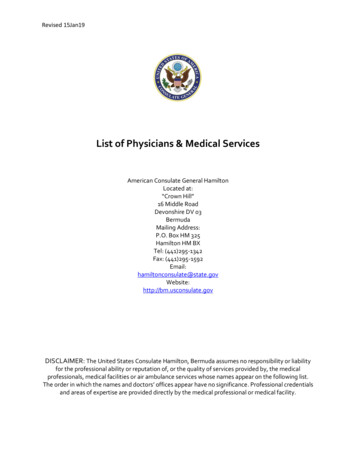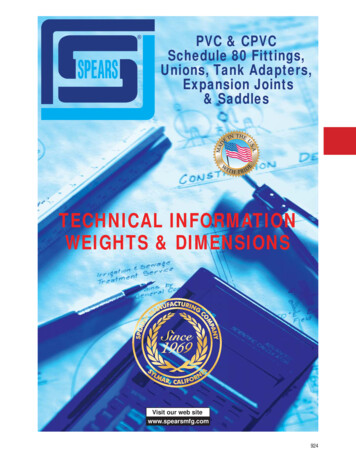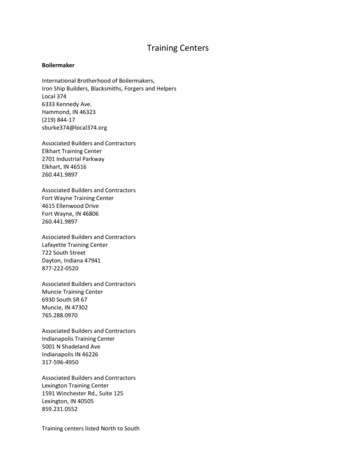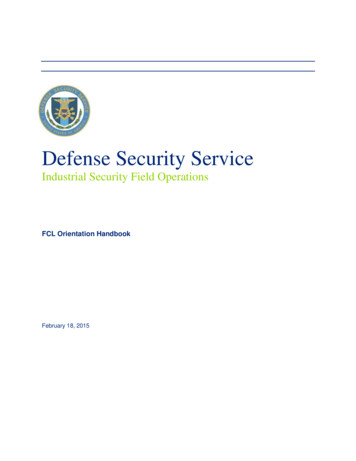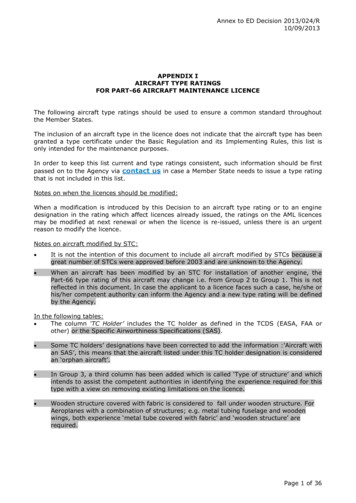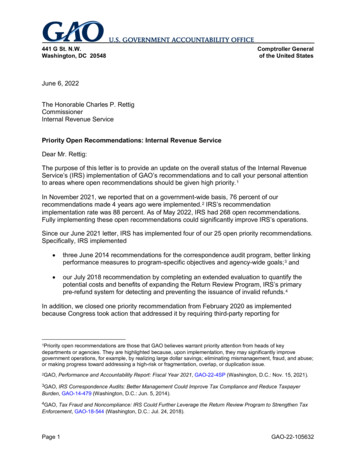
Transcription
441 G St. N.W.Washington, DC 20548Comptroller Generalof the United StatesJune 6, 2022The Honorable Charles P. RettigCommissionerInternal Revenue ServicePriority Open Recommendations: Internal Revenue ServiceDear Mr. Rettig:The purpose of this letter is to provide an update on the overall status of the Internal RevenueService’s (IRS) implementation of GAO’s recommendations and to call your personal attentionto areas where open recommendations should be given high priority. 1In November 2021, we reported that on a government-wide basis, 76 percent of ourrecommendations made 4 years ago were implemented. 2 IRS’s recommendationimplementation rate was 88 percent. As of May 2022, IRS had 268 open recommendations.Fully implementing these open recommendations could significantly improve IRS’s operations.Since our June 2021 letter, IRS has implemented four of our 25 open priority recommendations.Specifically, IRS implemented three June 2014 recommendations for the correspondence audit program, better linkingperformance measures to program-specific objectives and agency-wide goals; 3 and our July 2018 recommendation by completing an extended evaluation to quantify thepotential costs and benefits of expanding the Return Review Program, IRS’s primarypre-refund system for detecting and preventing the issuance of invalid refunds. 4In addition, we closed one priority recommendation from February 2020 as implementedbecause Congress took action that addressed it by requiring third-party reporting for1Priorityopen recommendations are those that GAO believes warrant priority attention from heads of keydepartments or agencies. They are highlighted because, upon implementation, they may significantly improvegovernment operations, for example, by realizing large dollar savings; eliminating mismanagement, fraud, and abuse;or making progress toward addressing a high-risk or fragmentation, overlap, or duplication issue.2GAO,Performance and Accountability Report: Fiscal Year 2021, GAO-22-4SP (Washington, D.C.: Nov. 15, 2021).3GAO, IRS Correspondence Audits: Better Management Could Improve Tax Compliance and Reduce TaxpayerBurden, GAO-14-479 (Washington, D.C.: Jun. 5, 2014).4GAO,Tax Fraud and Noncompliance: IRS Could Further Leverage the Return Review Program to Strengthen TaxEnforcement, GAO-18-544 (Washington, D.C.: Jul. 24, 2018).Page 1GAO-22-105632
transactions involving virtual currency. 5 The increased reporting, which takes effect beginningwith the 2023 tax year, could improve tax compliance by providing IRS with better informationabout virtual currency transactions, making it easier for certain taxpayers to complete taxreturns.We ask your continued attention to the 20 remaining priority recommendations. We are alsoadding five new recommendations related to improving taxpayer services and reducing taxfraud. This brings the total number of current priority recommendations to 25. (See theenclosure for the list of these recommendations and actions needed to implement them.)The 25 priority recommendations fall into the following six areas.1. Improving taxpayer services. High-quality customer service makes it easier for taxpayers tovoluntarily file their tax returns and pay taxes owed. However, IRS has struggled to meettaxpayer service demands with an unprecedented call volume and growing backlog of taxpayercorrespondence from prior years. Millions of taxpayers have experienced long delays inreceiving refunds. It will be difficult for IRS to provide taxpayers assistance if they continue tocall or write IRS when they cannot get the information they need through IRS’s online services.Eight priority recommendations in this area include communicating estimated time frames forresolving its correspondence backlog and developing additional options for taxpayers to file theirreturns online for free. This would help IRS allocate its finite resources to improve taxpayerservice and assess its progress toward an improved taxpayer experience.2. Reducing tax fraud and improper payments. Tax noncompliance, including refund fraud,threatens the integrity of the tax system and costs the federal government hundreds of billionsof dollars annually. Detecting fraudulent tax returns has become increasingly difficult for IRS asfraudsters gain access to more personal and financial information, which they use to file returnsthat appear legitimate. Six priority recommendations in this area include implementing a methodto digitize information from paper-filed tax returns and developing a fraud risk profile forbusiness identity theft. This would help IRS better defend itself and taxpayers against tax refundfraud and reduce improper payments that should not have been made or were made in incorrectamounts.3. Improving cybersecurity. Implementing the one priority recommendation in this area wouldcentralize leadership for IRS’s efforts overseeing cybersecurity practices of third-party providers,such as paid tax return preparers and tax software providers. If these third parties do notproperly secure taxpayers’ personal and financial information, taxpayers will be vulnerable todata breaches that expose their information for use by fraudsters to commit identity theft refundfraud.4. Enhancing information reporting. Implementing five priority recommendations in this area,for example by expanding third-party information reporting to improve sole proprietorcompliance, would help IRS improve the intake, processing, and use of information returns. Bymatching information returns reported by third parties against information reported by taxpayers,IRS identifies potential fraud and noncompliance for enforcement action. According to IRS5GAO, Virtual Currencies: Additional Information Reporting and Clarified Guidance Could Improve Tax Compliance,GAO-20-188 (Washington, D.C.: Feb. 12, 2020), and Infrastructure Investment and Jobs Act, Pub. L. No. 117-58, §80603, 135 Stat. 429, 1339–1341 (2021).Page 2GAO-22-105632 IRS Priority Recommendations
research, taxpayers are more likely to misreport income when little or no third-party informationreporting exists than when substantial reporting exists.5. Improving audit effectiveness. Auditing tax returns is a critical part of IRS’s strategy toensure tax compliance and address the tax gap, which is the difference between taxes owedand those paid on time. Implementing three priority recommendations in this area, includingimproving how IRS defines large partnerships and analyzing results of partnership audits, wouldbetter inform IRS decisions about how to allocate limited audit and enforcement resources.6. Enhancing strategic human capital management. IRS continues to face capacitychallenges with skills gaps in mission-critical enforcement staff. Moreover, IRS continues to relyon expensive overtime to manage the unprecedented workloads for processing tax returns andassisting taxpayers. Implementing two priority recommendations in this area would position IRSto identify the workforce needed for the future and address skills gaps, as well as to useovertime efficiently to meet objectives.In March 2021, we issued our biennial update to our High-Risk List, which identifies governmentoperations with greater vulnerabilities to fraud, waste, abuse, and mismanagement or the needfor transformation to address economy, efficiency, or effectiveness challenges. 6 One of ourhigh-risk areas, enforcement of tax laws, centers directly on IRS.Several other government-wide high-risk areas also have direct implications for IRS and itsoperation. These include (1) ensuring the cybersecurity of the nation, 7 (2) improving themanagement of IT acquisitions and operations, (3) strategic human capital management,(4) managing federal real property, and (5) government-wide personnel security clearanceprocess. We urge your attention to the enforcement of tax laws high-risk area as well as thegovernment-wide high-risk issues as they relate to IRS. Progress on high-risk issues has beenpossible through the concerted actions and efforts of Congress, the Office of Management andBudget (OMB), and the leadership and staff in agencies, including IRS. In March 2022, weissued a report on key practices to successfully address high-risk areas, which can be a helpfulresource as your agency continues to make progress to address high-risk issues. 8----Copies of this letter are being sent to the Director of OMB, the Secretary of the Treasury, andappropriate congressional committees including the Committees on Appropriations, Budget,Finance, and Homeland Security and Governmental Affairs, United States Senate; theCommittees on Appropriations, Budget, Oversight and Reform, and Ways and Means, UnitedStates House of Representatives; and the Joint Committee on Taxation. In addition, the reportwill be available on the GAO website at http://www.gao.gov.6GAO,High-Risk Series: Dedicated Leadership Needed to Address Limited Progress in Most High-Risk Areas,GAO-21-119SP (Washington, D.C.: Mar. 2, 2021).7With regard to cybersecurity, we also urge you to use foundational information and communications technologysupply chain risk management practices set forth in our December 2020 report: GAO, Information Technology:Federal Agencies Need to Take Urgent Action to Manage Supply Chain Risks, GAO-21-171 (Washington, D.C.: Dec.15, 2020).8GAO,High-Risk Series: Key Practices to Successfully Address High-Risk Areas and Remove Them from the List,GAO-22-105184 (Washington, D.C.: Mar 3, 2022).Page 3GAO-22-105632 IRS Priority Recommendations
I appreciate IRS’s continued commitment to these important issues. If you have any questionsor would like to discuss any of the issues outlined in this letter, please do not hesitate to contactme or Jessica Lucas-Judy, Director, Strategic Issues, at lucasjudyj@gao.gov or (202) 512-6806,or James R. McTigue Jr., Director, Strategic Issues, at mctiguej@gao.gov or (202) 512-6806.Contact points for our Offices of Congressional Relations and Public Affairs may be found onthe last page of this letter. Our teams will continue to coordinate with your staff on all of the268 open recommendations. Thank you for your attention to these matters.Sincerely yours,Michelle SagerManaging Director, Strategic IssuesEnclosure – 1cc:Page 4The Honorable Shalanda Young, Director, OMBThe Honorable Janet Yellen, Secretary, Department of the TreasuryGAO-22-105632 IRS Priority Recommendations
EnclosurePriority Open Recommendations: Internal Revenue Service1. Improving Taxpayer ServicesTax Filing: Actions Needed to Address Processing Delays and Risks to the 2021 Filing Season.GAO-21-251. Washington D.C.: March 1, 2021.Recommendation: The Commissioner of Internal Revenue should revise IRS’s estimates forresolving its backlog of work from the 2020 filing season.Action needed: IRS disagreed with this recommendation. IRS said it continues to monitor andassess the 2020 filing season carryover paper inventory daily, and that it adjusts processingpriorities based on constantly changing variables that affect the paper inventory backlog. InDecember 2021, IRS completed entering all remaining returns from 2020 into its systems forprocessing. As of April 2022, IRS officials said that, in general, these returns have been fullyprocessed. However, they said IRS may be holding some returns from 2020 for review due tocomplex errors. We requested data from IRS on how many returns from 2020 remainunprocessed to assess IRS’s progress on fully implementing this recommendation.Additionally, we reported in April 2022 that IRS’s backlog of taxpayer correspondence grew tomore than 8 million by the start of 2022. We are monitoring IRS’s efforts to address this backlogin a separate priority recommendation. Addressing its backlog of work would enable IRS tobetter serve taxpayers and deliver long-overdue refunds from the 2020 filing season.High-risk area: Enforcement of Tax LawsDirector: Jessica Lucas-Judy, Strategic IssuesContact information: lucasjudyj@gao.gov or (202) 512-6806Tax Filing: 2021 Performance Underscores Need for IRS to Address Persistent Challenges.GAO-22-104938. Washington, D.C.: April 11, 2022.Recommendation: The Commissioner of Internal Revenue should estimate time frames forresolving IRS's correspondence backlog, monitor and update these estimates periodically, andcommunicate this information to taxpayers and stakeholders.Action needed: IRS agreed with the recommendation. In its March 2022 comments on thereport, IRS stated that it continues to work to return its correspondence inventory to normallevels. To fully implement this recommendation, IRS needs to clearly communicate estimatedtime frames for resolving correspondence so taxpayers know when to reasonably expect aresponse or refund. Without clear, timely information on IRS’s processing time frames foraddressing taxpayer correspondence, taxpayers will continue to call, write, or visit IRS in personto try to obtain this information, and IRS will continue to struggle to meet demands for taxpayercustomer service and in processing returns.Recommendation: The Commissioner of Internal Revenue should work with Treasury todevelop and implement a modernization plan for “Where’s My Refund” that fully addressestaxpayer needs and requirements.Page 5GAO-22-105632 IRS Priority Recommendations
Action needed: IRS agreed with this recommendation. In its March 2022 comments on thereport, IRS stated that implementation of this effort will be contingent on available funding. IRSalso stated that it is conducting research, to be completed in the spring of 2022, to gatherinsights on user needs and expectations regarding refund status messaging. This indicates thatIRS is in the early stages of gathering user requirements for “Where’s My Refund,” an initial stepfor an information technology modernization effort.To fully implement this recommendation, IRS needs a plan to address technical limitations withthe current application or develop a new application to better serve taxpayers in the future.Without clear leadership direction and a plan and timeline for modernizing “Where’s MyRefund,” IRS will not be positioned to better serve taxpayers in the future. Further, it will bedifficult for IRS to reduce the burden of additional workload on IRS staff and associated costswhen taxpayers call or write IRS when they cannot get the information they need through“Where’s My Refund.”High-risk area: Enforcement of Tax LawsDirector: Jessica Lucas-Judy, Strategic IssuesContact information: lucasjudyj@gao.gov or (202) 512-6806Tax Administration: Taxpayer Input Could Strengthen IRS's Online Services. GAO-20-71.Washington, D.C.: December 19, 2019.Recommendation: The Commissioner of the IRS should direct the Commissioner of Wage andInvestment (W&I) to work with the Director of the Office of Online Services (OLS) to ensure thatfuture decisions regarding whether to renew the Free File agreement incorporate findings from acomprehensive examination of the benefits and costs of the agreement as it relates to long termplans for IRS's online services, including plans to file amended returns electronically.Action needed: IRS agreed with this recommendation. A March 2021 IRS analysis addresseda portion of the recommendation by identifying potential benefits, such as lower costs inprocessing electronic returns compared to paper ones. However, IRS did not discuss how theFree File program should be coordinated with online services offered to taxpayers, such asonline accounts.Important developments have occurred since we made this recommendation, including theDecember 2019 revision of the agreement between IRS and industry removing a prohibition onan IRS-run online filing system. Also, two large companies left the Free File program in 2020and 2021, which makes it more difficult for taxpayers to find an online filing method guaranteedto be free. Further, IRS announced in May 2020 that taxpayers would be able to file anamended return electronically using commercial software for tax years 2020 and 2019.However, as of May 2022, only a current year return for tax year 2021 may be filed through theFree File program.To fully implement this recommendation, IRS needs to undertake a more complete analysis ofthe agreement to inform decisions about the future direction of online services for individualtaxpayers and next steps regarding the Free File agreement, which is set to expire at the end ofOctober 2023. Without more rigorous examination, IRS is not positioned to manage themounting risks of its reliance on the agreement nor to consider how Free File fits with itsgrowing portfolio on online services.Page 6GAO-22-105632 IRS Priority Recommendations
High-risk area: Enforcement of Tax LawsDirector: Jessica Lucas-Judy, Strategic IssuesContact information: lucasjudyj@gao.gov or 202-512-5172IRS Free File Program: IRS Should Develop Additional Options for Taxpayers to File for Free.GAO-22-105236. Washington, D.C.: April 28, 2022.Recommendation: The Commissioner of IRS should, before the expiration of the current FreeFile Memorandum of Understanding in October 2023, work with relevant stakeholders to identifyand develop additional options for free online filing of tax returns that would reflect currentguidelines for federal digital services.Action needed: IRS disagreed with this recommendation. In its April 2022 comments on thereport, IRS stated that it currently does not believe a public free filing option would significantlyimprove the taxpayer experience and it does not have sufficient funding to do this. IRS leavesopen the possibility that it would reconsider its position if Congress enacted new legislation orfunding. IRS has an information advantage over private tax preparation and filing companiesthat could simplify the filing process. Further, IRS would not necessarily need to develop newfiling options on its own. IRS could address resource challenges by leveraging entities such asthe U.S. Digital Service and Code for America.While IRS expressed concern about the resources required to develop an alternative, suchconcern needs to be weighed against the potential of an abrupt end to the program and thecustomer service challenges it would present. As such, IRS should start planning to avoid suchan outcome. Ensuring IRS is well positioned to offer free online filing services to taxpayers willhelp mitigate the risks and uncertainty associated with the Free File program.High-risk area: Enforcement of Tax LawsDirector: James R. McTigue, Strategic IssuesContact information: mctiguej@gao.gov or (202) 512-6806Taxpayer Service: IRS Could Improve the Taxpayer Experience by Using Better ServicePerformance Measures. GAO-20-656. Washington, D.C.: September 23, 2020.Recommendation: The Commissioner of Internal Revenue should identify agency-wide anddivision performance goals that align with IRS's strategic service goals and objectives for animproved taxpayer experience.Recommendation: The Commissioner of Internal Revenue should identify performancemeasures with targets for improving the taxpayer experience that link with the relatedperformance goals.Actions needed: IRS generally agreed with both of these related recommendations. In itsJanuary 2021 Taxpayer First Act Report to Congress, IRS identified a new framework ofstrategic goals and objectives for improving the taxpayer experience and some high-levelPage 7GAO-22-105632 IRS Priority Recommendations
service performance measures with targets for improving the taxpayer experience. 9 However,the report did not specify related performance goals aligned with strategic goals for assessingprogress in improved taxpayer experience outcomes, particularly in the divisions that providetaxpayer services.As of March 2022, IRS officials said that the fiscal year 2022-2026 IRS Strategic Plan, which isexpected to be completed in the spring of 2022, will include strategic goals, objectives, andsupporting measures for agency-wide and division performance goals that align with IRS’staxpayer service goals. We will review the forthcoming plan to determine if IRS has fullyimplemented these priority recommendations. IRS needs to clearly state performance goals fordesired improvements in the taxpayer experience and specify their related measures withtargets. Without such performance information, it will be challenging for IRS and stakeholders toassess progress made toward an improved taxpayer experience and providing top-qualityservice.High-risk area: Enforcement of Tax LawsDirector: Jessica Lucas-Judy, Strategic IssuesContact information: lucasjudyj@gao.gov or (202) 512-6806Tax Administration: Opportunities Exist to Improve Monitoring and Transparency of AppealResolution Timeliness. GAO-18-659. Washington, D.C.: September 21, 2018.Recommendation: The Commissioner of Internal Revenue should establish time frames andmonitoring procedures for timely transfer of taxpayer appeals requests by examinationcompliance units to the Office of Appeals.Action needed: IRS agreed with this recommendation. All four IRS divisions established anddocumented time frames for timely examination appeal transfer. Three divisions havedemonstrated procedures in place for monitoring timely appeal transfer. One division—SmallBusiness/Self Employed (SB/SE)—has updated its Internal Revenue Manual guidance on timelyappeal request transfer requirements. In May 2022, SB/SE provided additional informationabout the steps involved when a taxpayer appeal request needs additional information or reviewbefore transfer. We will review this information to determine whether IRS has fully demonstratedhow it monitors timeliness across the range of examination cases that SB/SE handles.To fully implement this recommendation, IRS needs to demonstrate monitoring capability toensure the timely transfer of all examination appeals, including those from the SB/SE division.Delays in transferring such requests can result in increased interest costs for taxpayers becauseinterest continues to accumulate on the tax liability during the appeal process. Further,taxpayers unsure of the status of their appeals may call or write to IRS, tying up staff respondingto inquiries about appeals delayed in transfer.High-risk area: Enforcement of Tax LawsDirector: Jessica Lucas-Judy, Strategic IssuesContact information: lucasjudyj@gao.gov or (202) 512-68069IRS,Taxpayer First Act: Report to Congress, (Publication 5426: Jan. 11, 2021). The report addresses threeprovisions of the Taxpayer First Act, each of which included a requirement to report to Congress. Pub. L. No. 116-25,§§ 1101, 1302, 2402, 133 Stat. 981, 985–986, 993, 1014 (2019).Page 8GAO-22-105632 IRS Priority Recommendations
2. Reducing Tax Fraud and Improper PaymentsIdentity Theft: IRS Needs to Strengthen Taxpayer Authentication Efforts. GAO-18-418.Washington, D.C.: June 22, 2018.Recommendation: In accordance with the plan developed for implementing changes to itsonline authentication programs, the Commissioner of Internal Revenue should implementimprovements to IRS’s systems to fully implement the National Institute of Standards andTechnology’s (NIST) new guidance.Action needed: IRS agreed with this recommendation and has taken steps to implement it asof February 2022. Efforts include taking steps to create a new online authentication platform toauthenticate taxpayers’ identities using external partners, consistent with NIST guidance. 10 IRShas also worked with external partners to test its platform, including conducting a usability studyto understand the user experience. In January 2022, IRS told us that it has begun using theplatform for taxpayer authentication for several online applications and plans to continue addingapplications to this new platform through this summer. As of February 2022, IRS expected tocomplete implementation in February 2023. To fully implement this recommendation, IRS mustcomplete migrating its online authentication applications to a new NIST-compliant platform.Improving its ability to authenticate taxpayer identities will better position IRS to respond toknown and unknown threats to the tax system.High-risk area: Enforcement of Tax LawsDirector: James R. McTigue Jr., Strategic IssuesContact information: mctiguej@gao.gov or (202) 512-6806Tax Fraud and Noncompliance: IRS Could Further Leverage the Return Review Program toStrengthen Tax Enforcement. GAO-18-544. Washington, D.C.: July 24, 2018.Recommendation: The Commissioner of Internal Revenue should implement the most costeffective method to digitize information provided by taxpayers who file returns on paper.Action needed: IRS agreed with this recommendation and is taking steps to implement itsdigitization strategy and use the Return Review Program’s (RRP) capabilities. As of May 2022,IRS reported that it expects RRP’s fraud filters and enhanced enforcement capabilities to befully connected to certain amended digitized forms in 2022. To fully implement thisrecommendation, however, IRS must fully digitize paper tax returns at intake. This would allowIRS to reduce processing time, use the RRP fraud filters on all paper and electronic forms, andallow more pre-refund compliance checks or investigations, among other benefits.Recommendation: Based on its evaluation of RRP, the Commissioner of Internal Revenueshould expand RRP to support identified activities. 1110NIST,Electronic Authentication Guideline, Special Publication 800-63-2 (August 2013), superseded by DigitalIdentity Guidelines, Special Publication 800-63-3 (June 2017).11In January 2022, IRS implemented a previous priority recommendation to evaluate the costs and benefits ofexpanding RRP to analyze individual returns not claiming refunds to support other enforcement activities.Page 9GAO-22-105632 IRS Priority Recommendations
Action needed: IRS agreed with this recommendation, noting that an agency goal is to expandthe use of RRP to improve tax compliance and enforcement. In January 2022. IRS reported itscompleted evaluation identified increased revenue and cost savings from using RRP in certainenforcement activities. As of May 2022, IRS reported that it is also working to connect RRP'sexpanded enforcement capabilities to digitized amended paper returns. To fully implement thisrecommendation, IRS needs to continue leveraging RRP capabilities to support otherenforcement activities. Fully expanding RRP will help IRS streamline its detection and treatmentof fraud and increase taxpayer compliance.High-risk area: Enforcement of Tax LawsDirector: James R. McTigue, Jr., Strategic IssuesContact information: mctiguej@gao.gov or (202) 512-6806Identity Theft: IRS Needs to Better Assess the Risks of Refund Fraud on Business-RelatedReturns. GAO-20-174. Washington, D.C.: January 30, 2020.Recommendation: The Commissioner of Internal Revenue should designate a dedicated entityto provide oversight of agency-wide efforts to detect, prevent, and resolve business identity theft(business IDT) refund fraud, consistent with leading practices. This may involve designating onebusiness unit as a lead entity, or leveraging cooperative relationships between business units toestablish a business IDT leadership team. This entity should have defined responsibilities andauthority for managing fraud risk.Action needed: IRS agreed with the recommendation, but it has provided conflictinginformation on its implementation plans. In September 2020, IRS initially assigned oversight ofits agency-wide efforts on business IDT to an executive steering committee. However, inFebruary 2021, IRS officials stated that the agency is restructuring this executive steeringcommittee and the restructured executive steering committee had not assumed the oversightrole for business IDT. In May 2021, IRS officials stated that the committee would continue toserve as an interim oversight body on business IDT until IRS fully establishes the role of Chiefof Identity Theft and Fraud, a new role described in its January 2021 Taxpayer First Act Reportto Congress.As of May 2022, IRS has not shown how the executive steering committee serves as theoversight body for business IDT. Instead, IRS described work developing fraud filters at thebusiness unit level. Although IRS characterized this as a coordinated approach, these unitshave limited authority to oversee business IDT, as we reported in January 2020.IRS officials stated that transitioning oversight to the new chief position may take up to 2 years.To fully implement this recommendation, IRS needs to demonstrate that the new leadershipposition has defined responsibilities and authority for managing fraud risk. We continue tomonitor whether IRS is providing centralized oversight consistent with leading practices for fraudrisk management in the interim. IRS’s continued attention is important for coordinating its effortsto combat the evolving threat of business IDT.Recommendation: The Commissioner of Internal Revenue should develop a fraud risk profilefor business IDT that aligns with leading practices. This should include (1) identifying inherentfraud risks of business IDT, (2) assessing the likelihood and impact of inherent fraud risks,(3) determining fraud risk tolerance, and (4) examining the suitability of existing fraud controls.Page 10GAO-22-105632 IRS Priority Recommendations
Action needed: IRS agreed with the recommendation. In October 2020, IRS completed a fraudrisk assessment of 35 business-related tax forms using six quantitative measures of IDT refundfraud risk. As a result of this effort, IRS identified seven business-related tax forms that pose asignificant fraud risk but currently lack effective fraud controls. IRS officials stated that thisinformation will be used to determine priorities for implementing new fraud filters, asappropriate.In May 2022, IRS provided updated information about its fraud risk profiling efforts. We arereviewing the material to determine whether IRS has demonstrated additional actions taken toidentify and assess other inheren
threatens the integrity of the tax system and costs the federal government hundreds of billions . such as paid tax return preparers and tax software providers. If these third parties do not . monitoring Authorized e-file Provider program compliance, and tracking security incident reports. Without this structure, it is unclear how IRS will .
